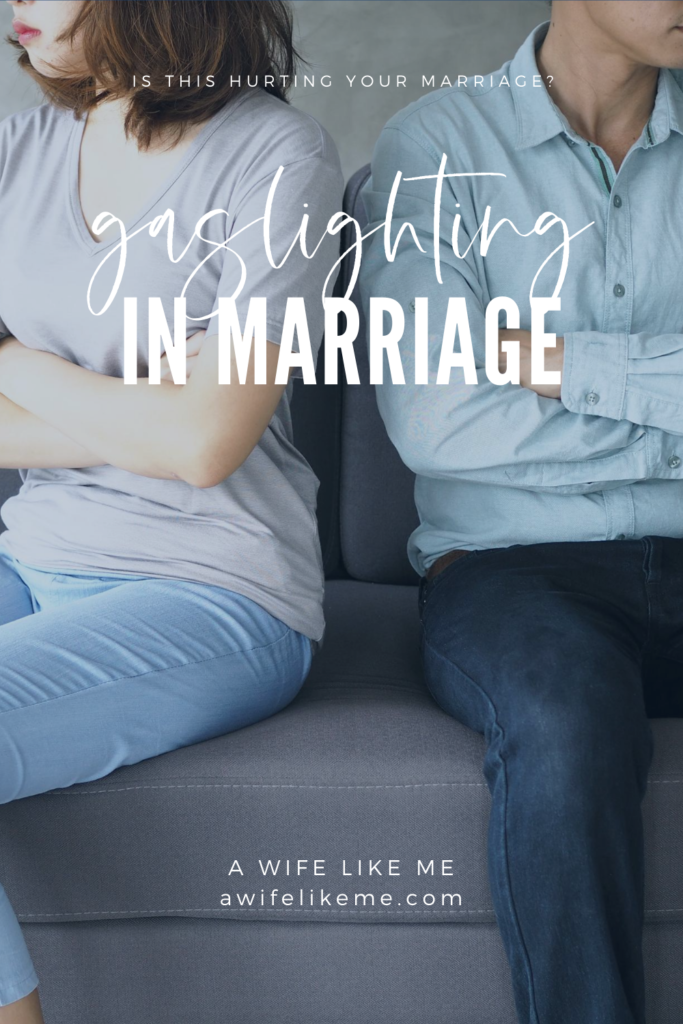How Gaslighting Can Hurt Your Marriage

Someone recently told me that they are not responsible for how their words make other people feel. This was in response to me approaching them, requesting to be treated with kindness and respect. But this was the response I received, along with further indifference.
This response is an example of gaslighting.
On one hand, we cannot control how people respond to our words. We shouldn’t revolve our lives around making sure people feel a certain way. We aren’t responsible for anyone else’s emotional health. But we do have the responsibility to own our actions when we’ve hurt others.
The book The Gaslight Effect defines gaslighting as “when you don’t take responsibility for your actions, or deflect responsibility, or try to undermine the credibility of the person asking you about your actions.” (xxv)
The person in my example refused to take responsibility for their actions, and later deflected the responsibility of the hurt onto the victim.
Gaslighting is a form of emotional abuse that has recently become more well known. Gaslighting in marriage can be minimal, or it can be a very serious problem that turns into abuse.
Gaslighting in Marriage
A gaslighter will turn problems you bring to them back onto you. They refuse to take responsibility, and twist the issue around making it your fault. A minor gaslighter can be approached about this, then show repentance and change their behavior. But a more serious gaslighter will become angrier when boundaries are set.
The Gaslight Effect gives many examples of things a gaslighter might do: make you doubt your own perception of reality or your own memory, use your morals against you (“A good Christian wouldn’t do that to me”), or make jokes that are actually put downs, and then call you too sensitive. Gaslighters essentially say that if you say they did something hurtful towards you, it’s somehow your fault. There are many more things that are forms of gaslighting that can be hard to see on your own. A counselor can help you sort the truth out from the lies you may be hearing.
Putting an End to Gaslighting
The solution to end gaslighting is simple, but can be hard to implement. We personally can’t control how the gaslighter acts, but we can separate ourselves from the effects of gaslighting.
The Gaslight Effect says, “You can end the gaslighting as soon as you stop trying to win the argument or convince your gaslighter to be reasonable. Instead, you can simply opt out.” (34) For minor gaslighters, boundaries like this will show them their responsibility in a relationship and they will then make changes. For more serious gaslighters, it will make them angry and possibly more abusive. At that point, professional support is recommended.
The person in the story I referenced above refused to take responsibility for their actions, and later began mocking me. Since a healthy relationship with that person was not possible after my multiple requests for one, I told that person I would not continue a relationship with them.
This short article is meant to bring awareness to the issue of gaslighting. There is much more to learn about it, so I recommend the book I frequently referenced here, The Gaslight Effect by Dr. Robin Stern. It is not a Christian book, but you can gain wisdom from it.
Ultimately, we choose how we allow ourselves to be treated, even if other people put the blame on us or twist our healthy boundaries back on us. In serious cases of gaslighting and abuse, we can choose to place strong boundaries against the recurring behavior. Working to set limits on how you are treated can help put an end to gaslighting.
Wife Step: Look for signs of gaslighting in your spouse and in yourself. If you notice anything, seek help from a counselor.

Meagan Elling is a wife of 7 years to Reed, mama to two little girls, writer, and house renovator. She is a SAHM {I’ll let you decide if you want this spelled out or not} in Duluth, MN with a writing degree she thought would go to waste. She is passionate about encouraging women, ministry, traveling, reading 5 books at once, and Texas Roadhouse bread. Meagan writes at www.meaganelling.com and on Instagram @meaganelling.


0 Comments